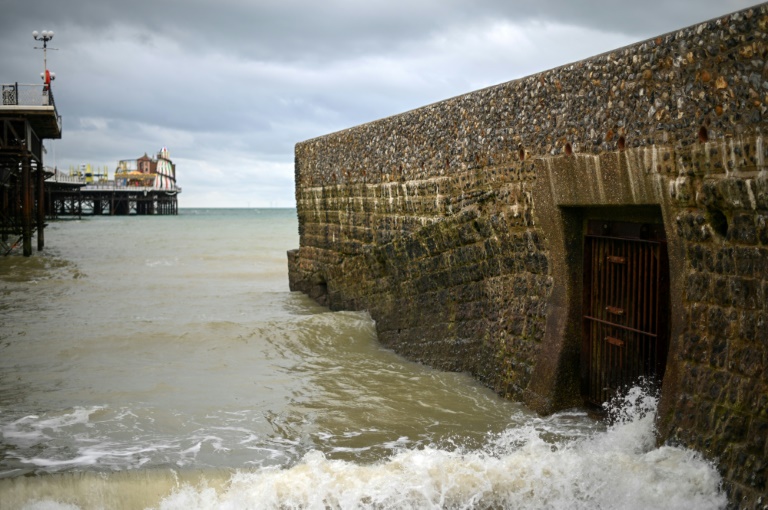Brighton, on England’s south coast, has been described as Britain’s hippest city, and is a haven for tourists, especially Londoners keen to escape the capital.
But surfer Stu Davies says the waters off Brighton and along the Channel coast are less attractive, describing them as an “open sewer”.
Human faeces, wipes and tampons are regularly discharged into seas and rivers, angering local residents who are now taking action.
“First hand I have surfed in raw sewage in this coast and city, and it’s disgusting,” Davies, a member of Surfers Against Sewage (SAS), told AFP on a seawall in the seaside resort.
A short distance away, a storm overflow pipe stretches out across the beach towards the popular pier, before being slowly submerged by the rising tide.
Similar structures dot the British coastline.
“Suddenly you become aware of the smell, you can smell sewage, you can smell faeces and you can see faeces, and see bits of tissue and paper and other things that folk put down their toilets and enter into the sewage network,” Davies said of encountering waste while surfing.
The water also takes on a “brownish” hue, he added.
In very heavy rainfall, water companies are permitted to dump such waste to prevent sewers, many of which date back to the 19th century, from becoming clogged and flowing back into buildings.
According to SAS, which campaigns for clean water, water companies reported more than 5,500 discharges in the year to the end of September — an 87.6-percent increase in one year.
The association, which has developed an app to alert swimmers and surfers, points out that more and more discharges occur during “normal rainfall events”, not exceptional precipitation.
It also believes that the figure largely underestimates the problem because it only refers to coastal waters.
“This is clearly being used as a means of regular sewage disposal,” said SAS director Hugo Tagholm.
– Ear infections –
The Environment Agency found that only 14 percent of English rivers were “environmentally satisfactory” in 2020.
Christian Dunn, from the Department of Natural Sciences at Bangor University in Wales, warned of a “death potion” of sewage and agricultural and industrial waste that could wipe out aquatic life.
Swimmers are also suffering from the presence of pathogens.
Despite the grey December morning, Susan Moate still takes her daily dip into the cold murky water of the River Ouse, which flows through Lewes, and down to the sea at Brighton some 10 miles (16 kilometres) away.
While the benefits to her mental health are enormous, the 38-year-old violin teacher is no longer willing to submerge her head after getting repeated ear infections.
The doctor told her it was to be expected when swimming “in dirty water”.
The same is true of Whitstable, a seaside resort on the Thames estuary, known for its oysters — and the Southern Water treatment plant.
“I’ve been sick twice.
Many local people are telling us they have been sick, or their dogs have been sick,” said Elane Heffernan, of the SOS Whitstable campaign group.
From oyster farming to windsurfing, local businesses are also suffering from the pollution, she added.
Southern Water was fined a record £90 million ($119 million, 106 million euros) in July after admitting nearly 7,000 illegal discharges into the sea and rivers between 2010 and 2015.
These combined discharges lasted “a total of 61,704 hours, the equivalent of just over seven years”, the Environment Agency said.
– Bill boycott –
Some residents are even boycotting payment of their water bills — with the support of Boomtown Rats singer and Live Aid mastermind Bob Geldof, who lives in Faversham, inland from Whitstable.
In response, Southern Water has said: “We know our performance has to improve and we are… spending £2 billion to cut pollution incidents by 80 percent by 2025.”
The Environment Agency and the industry regulator announced in November they were investigating after companies admitted unauthorised discharges.
Under strong public pressure, the government included in its new post-Brexit environment law an obligation for water companies to “significantly” reduce discharges from storm-water overflows.
But SAS’s Tagholm said the government needs to go further and force water companies to invest much more in their infrastructure, with the objective of zero discharge into bathing waters by 2030.
Since the privatisation of the water sector in 1989, he believes the companies have put “profits over people or the planet”.










